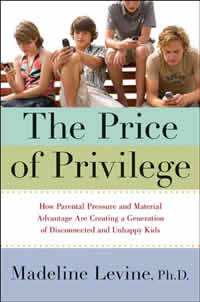Book Notes
 Madeline Levine, The Price of Privilege; How Parental Pressure and Material Advantage Are Creating a Generation of Disconnected and Unhappy Kids (New York: HarperCollins, 2006), 246pp.
Madeline Levine, The Price of Privilege; How Parental Pressure and Material Advantage Are Creating a Generation of Disconnected and Unhappy Kids (New York: HarperCollins, 2006), 246pp.
Madeline Levine knows the afflictions of affluence. Although she was raised in a blue collar setting and her family even lived on state assistance for a while, for thirty years she's lived in Marin County, California, just across the Golden Gate Bridge, where she's raised a family of five and practiced as a clinical psychologist. In addition to her personal experiences as a mother and a clinician, her book includes the findings of social-scientific studies, cultural analyses, and the insights of her colleagues to explore the "paradox of privilege." Why are there so many kids "whose problems seem out of proportion to their life circumstances?" Why do her adolescent patients have some of the highest rates of dysfunctional behaviors, including addictions, eating disorders, cutting, burning, depression, insomnia, boredom, substance abuse, and anxiety? Why have adolescent suicides quadrupled since 1950?
Levine encourages us to take an "unflinching look at our parenting skills." There she finds two contributing factors: achievement pressure and maladaptive perfectionism that make kids feel like parental love depends upon performance. Kids also feel isolated from their parents, even those overweening parents who, out of their own neediness, are not simply involved in the lives of their kids but downright intrusive. Levine teases out the distinctions between support and micro-management, wholesome encouragement and overbearing pressure. She also spends considerable time deconstructing the more toxic elements of affluent cultures, encouraging parents to resist the status quo of overwrought competition, perfectionism, and materialism.
All parents have limited abilities, skills, and opportunities, not to mention their own family of origin baggage. Children are all different and unpredictable, so there is no one-size-fits-all set of techniques that guarantees success. Levine is empathetic and realistic; she never makes you feel like parenting requires sainthood. I especially appreciated the several times she shared her own family failures and successes. She repeatedly returns to the special influence of mothers on their children, along with their unique challenges (including her entire last chapter). I'm sure that many of the problems she describes exist not merely in affluent communities but most everywhere. The wisdom she offers in this book will help any parent, no matter where they live.


